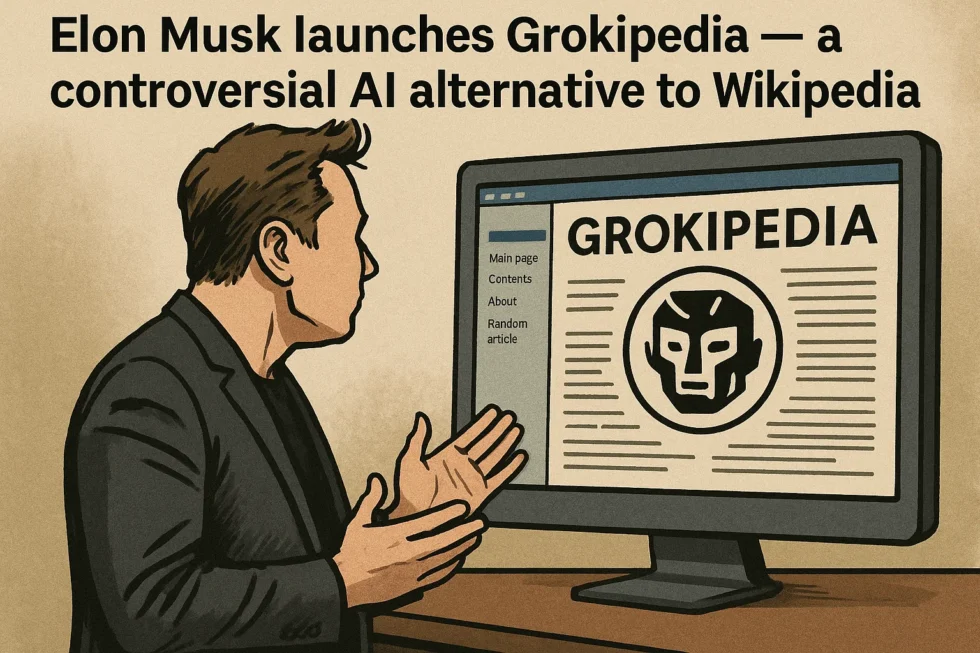Elon Musk launches Grokipedia — a controversial AI alternative to Wikipedia

Elon Musk’s artificial intelligence company xAI has officially launched the first version of Grokipedia, a new online encyclopedia generated entirely by AI. The platform, currently running under version 0.1, contains around 885,000 English-language articles. It represents roughly ten percent of Wikipedia’s size but differs in its fully automated structure and lack of translated or illustrated content. G.Business reports, citing The Verge (28 October 2025).
Background: Musk’s long-standing criticism of Wikipedia
Musk has for years accused Wikipedia of political bias, claiming that the platform leans ideologically to the left and lacks neutrality. By introducing Grokipedia, he aims to build what he calls a “neutral and intelligent knowledge base” supported by his own AI model Grok. The goal, according to xAI, is to establish a constantly updating system that learns autonomously and delivers fact-based information faster than human editors.
However, early analysis paints a different picture. Grokipedia currently offers no visual elements, citations, or editorial moderation. Many entries are long, unstructured text blocks that resemble early-stage AI outputs rather than curated encyclopedic content.
Reports of copied Wikipedia entries
According to The Verge, multiple Grokipedia articles appear to have been copied directly from Wikipedia, including explicit references to the CC BY-SA 3.0 license used by Wikimedia projects. One such example is the PlayStation 5entry, which mirrors large portions of Wikipedia’s text.
Further investigations by Wired found ideologically biased content in several topics, such as history and politics. Some sections reportedly include revisionist or right-wing interpretations, for example, attempts to justify slavery in historical contexts. Critics warn that such cases highlight a lack of editorial oversight and fact-checking mechanisms within Grokipedia.
Wikimedia Foundation reacts cautiously
A spokesperson for the Wikimedia Foundation told The Verge that the organization is still reviewing Grokipedia’s structure and content generation process. She stressed that Wikipedia remains the world’s largest non-commercial knowledge platform, created by volunteers worldwide. The Foundation emphasized that true neutrality requires human collaboration and transparency — something AI-driven projects currently cannot guarantee.
Ethical and legal implications
Grokipedia’s debut raises critical questions about the ownership and integrity of digital knowledge. Legal experts point out that reproducing licensed Wikipedia content without proper attribution may violate copyright terms, even under open licenses. Ethically, the platform challenges the principle of verifiable, human-curated truth that has long underpinned public knowledge systems.
Technology analysts also warn that AI-generated knowledge bases can amplify bias, depending on the datasets and moderation policies behind them. Without independent verification, the risk of spreading misleading or ideologically filtered information remains high.
xAI has not disclosed detailed moderation or correction procedures for Grokipedia. The company says it will continue to “train Grok for factual accuracy” and expand the database over time. Observers expect rapid growth in the coming months, but question whether the platform can meet journalistic or academic reliability standards.
Until a transparent editorial framework and verifiable sources are established, Grokipedia remains an experimental project — ambitious in scale but uncertain in trustworthiness.
Stay connected with business news that matters: timely, factual, and global insights shaping Germany and the world: Updated Xbox Game Pass Plans Explained: Essential, Premium, and Ultimate — What’s Best for You
